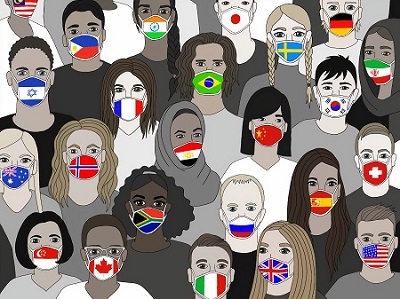Understanding the Cracks: What COVID-19 Means for the Mental Health of the Marginalized in the United States and Opportunities for Response
Understanding the Cracks: What COVID-19 Means for the Mental Health of the Marginalized in the United States and Opportunities for Response

Though none are immune to COVID-19, the rippling impacts of the current pandemic are unequal, due in part to pressing economic and social needs of minorities in the United States that are largely overlooked in response efforts. The economic downturn has disproportionately affected racial and ethnic minorities with unemployment claims greatest among Black and Hispanics/Latino individuals. In the midst of prolonged financial uncertainty and threat, families struggle to pay for food, housing, and utilities, along with countless other daily necessities. Feeding America estimated that 18 million children could be without food as a result of school closing and economic downturn—an increase that is also likely to disproportionately affect Black and Hispanic/Latino communities who already reported the highest rates of food insecurity. Unmet basic needs for food and shelter is accompanied by unmet safety needs, including access to accurate health information, protective equipment, and testing. Ethnic and racial minorities have rates of uninsurance up to three times greater than White people. In Illinois, more than half of confirmed COVID-19 cases are among ethnic and racial minorities, but minorities only make up one fourth of those tested.
Although the exact impact of COVID-19 on the mental health of racial and ethnic minorities in the United States remains unknown, prior research and the presence of multiple stressors suggests a bleak outcome. After battling the infection, survivors face the risk of long-term mental health consequences. One year after the SARS outbreak in 2003, 64% of surveyed survivors in China reported symptoms suggestive of a clinically significant mental health condition. Similar rates following the COVID-19 pandemic would be devastating for racial and ethnic minorities that have experienced higher infection rates and death rates than their White counterparts. The compounded stress from losing loved ones, ongoing threat of infection, unmet basic needs and economic instability among marginalized communities increases risk for anxiety, depression, and posttraumatic stress.
The bedrock of the current and foreseeable mental health problem is a system that has left marginalized populations with limited access to care–a system that prior to the pandemic failed to provide one in four racial and ethnic minorities in need with mental health services. The earthquake of health ramifications caused by COVID-19 has revealed and expanded a chasm that existed between quality care and those with the greatest need. And the aftershocks are still coming. Understanding the cracks in current communication, delivery, and treatment is imperative for a mental health response that leaves no one behind.
Cracks in Communication
In any crisis, communication is key for an effective response. Clear, succinct, and complete information about risk and what to do is essential for protecting both physical and mental health. Yet, current mental health communication streams frequently do not reach marginalized populations. Initial communication efforts in the United States about the impact of COVID-19 on mental health have been predominantly disseminated online in English. Ethnic and racial minority families with limited access to high-speed internet at home and a first language other than English are at risk for receiving incomplete or out-of-date information. Communication efforts should be expanded to provide psychoeducation in multiple languages across diverse platforms (e.g., social media, billboards, community boards) to help individuals and communities to protect mental health. Information about social and economic stressors experienced by racial and ethnic minorities also needs to be widely disseminated. Without an understanding of socio-economic realities that impact mental health, the effectiveness and sustainability of early mental health response efforts will be limited.
Cracks in Delivery
In response to the COVID-19 crisis, many mental health providers have transitioned their practice entirely online. Telemedicine has been shown to be an effective method for the delivery of mental health treatment and is widely considered an innovative way to increase access. Yet, basic commodities for telemedicine are not equitably distributed in the United States. A higher percent of White individuals in the United States own a smartphone than Black or Hispanic/Latino individuals. Even with a phone, job loss among Black and Hispanics/Latino individuals may make paying for enough minutes and data to support telehealth activities difficult. Finding the space and time to take a private mental health call can also be challenging as physical distancing efforts may result in more time spent with roommates and loved ones inside. Without thoughtful implementation that addresses the aforementioned challenges from the onset, telehealth is at risk of perpetuating many of the same inequalities from which the current system suffers.
Cracks in Treatments
Given the disproportionately high death rates among Black and Hispanic/Latino people, many are faced with grieving their loved ones without traditional mourning practices or being able to say goodbye. Grief is coupled with the ongoing threat of infection, social isolation, and job insecurity. Few treatments have been developed that target the intersection of grief, depression, anxiety, and posttraumatic stress symptoms that the current pandemic begets. Furthermore, treatments have rarely been developed purposefully for the unique challenges of ethnically diverse or minorities populations in the United States. Treatment content that is culturally insensitive, inadequately translated, or includes stiff jargon can be a barrier to receiving care. Without treatments that address the needs of underserved populations effectively, the cracks between care and need will likely deepen in the wake of COVID-19.
A Call to Action
The cracks within the system are wide and expand beyond delivery, treatment, and communication. Without a coordinated mental health response that includes political action, these cracks will likely increase. There is still an opportunity to ensure the challenges faced by racial and ethnic minorities are addressed in the mental health response. Policy that expands access now to basic needs and healthcare for the marginalized can decrease long-term mental health consequences that may arise following the pandemic. For example, investing in the development of a community-based workforce with the ability to provide clear information and deliver skill-based programs to boost mental health is one promising solution for reaching underserved communities. In the response and rebuilding, community engagement and prioritization of collaborative discourse that centers on the margins is essential for sustainable programs and policies. As our sense of normal has been challenged, there is an opportunity to upend the norm of marginalization in mental health care.














